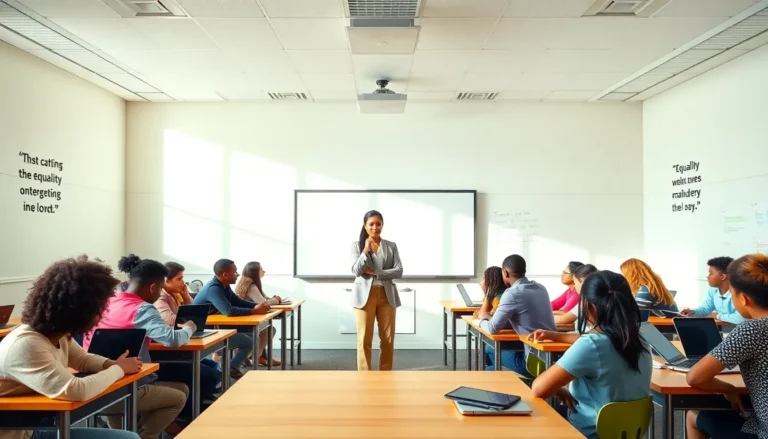Imagine a world where preschoolers are not just learning colors but crafting the skills that will carry them through life. While it sounds like a dream, early childhood education today is making this a reality. It’s a vibrant landscape filled with eager little minds, ready to absorb knowledge like sponges. This article dives deep into the significance, current trends, and challenges of early childhood education, all while keeping things engaging. Hang tight as we explore this transformative field.
Table of Contents
ToggleThe Importance of Early Childhood Education

Early childhood education is not just a nice-to-have: it’s essential for a solid foundation. Children are naturally curious, and early education taps into that curiosity, setting the stage for lifelong learning.
Benefits of Early Childhood Education
The benefits of early childhood education are far-reaching. Research shows that children who participate in quality preschool programs experience better academic outcomes in later years. They develop critical thinking skills, enhance their vocabulary, and often exhibit greater motivation to learn. Not only does this create a well-rounded individual, but it also contributes to society by fostering a generation of informed citizens.
Cognitive Development
Cognitive development is at the core of early childhood education. The brain develops rapidly in these formative years, making it crucial to provide stimulating environments. Interactive play, hands-on activities, and exposure to new concepts can significantly boost cognitive skills. Think about it: a child who learns through exploration and creativity is more likely to become an innovative thinker later in life.
Social and Emotional Skills
Social and emotional skills are equally important. Early childhood education offers children their first real interactions with peers and authority figures, helping them navigate relationships. They learn to share, resolve conflicts, and express feelings, skills critical for personal and professional success later on. These interactions foster resilience and empathy, creating emotionally intelligent individuals.
Current Trends in Early Childhood Education
Educational practices evolve, and early childhood education is no exception. A few trends are transforming how educators approach this vital stage.
Play-Based Learning
Play-based learning is taking the educational world by storm. Gone are the days of rigid structures and memorization. Instead, educators now recognize that play is fundamental to learning. Children engage in play that teaches them essential skills while keeping them emotionally invested in the learning process. From role-playing to building block towers, play nurtures creativity and critical thinking.
Technology Integration
Technology is undeniably a part of today’s world, and early childhood education has started to embrace it. Smart boards, educational apps, and interactive online resources make learning more engaging than ever. While one might worry about screen time, when used appropriately, technology can enhance educational experiences, making information accessible and exciting.
Culturally Responsive Teaching
Culturally responsive teaching is also gaining traction. As classrooms become more diverse, educators must embrace this diversity and incorporate multicultural perspectives into their teaching methods. Recognizing the unique backgrounds of students helps create an inclusive learning environment, allowing every child to see themselves represented in their education.
Challenges Facing Early Childhood Education
Even though its many benefits, early childhood education faces significant challenges that need addressing.
Funding and Resource Allocation
Funding remains a critical issue. Many early childhood programs are underfunded, leading to overcrowded classrooms, lack of materials, and high turnover rates among educators. Inadequate funding can restrict access to quality education, particularly in lower-income communities, and perpetuates existing inequities.
Workforce Development and Training
Workforce development is another challenge. Many educators in this field work for low wages and lack ongoing professional development opportunities. This can lead to high rates of turnover, which disrupts the continuity of care and education for children. Investing in teacher training and development is essential to improve outcomes for both educators and students.
Legislation and Policy Changes
Legislation plays a significant role in shaping early childhood education.
The Role of Policy in Early Childhood Education
Policies surrounding early childhood education can either advance or hinder progress. Recent legislative efforts have focused on increasing funding for preschool programs and implementing quality standards. But, there remains a need for comprehensive policies that not only support access but also emphasize quality in education. Advocacy for better policies can pave the way for a brighter educational landscape.
Future Directions for Early Childhood Education
What does the future hold for early childhood education? Several innovative practices are on the horizon, promising to revolutionize the sector.
Innovative Practices and Approaches
Educators are experimenting with innovative approaches, such as integrating social-emotional learning into curricula or adopting nature-based classroom settings. These strategies emphasize a holistic approach to education, ensuring that children not only learn academically but also grow emotionally and socially.
Community Involvement and Support
Community involvement is crucial for robust early childhood education systems. Programs that partner with parents and local organizations often see better results. Engaging communities in the educational process not only provides additional resources but also fosters a culture of support around children.



